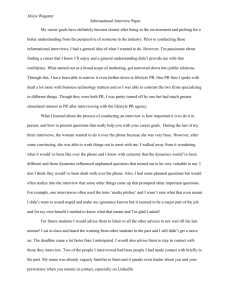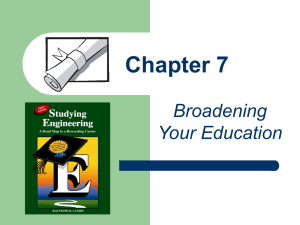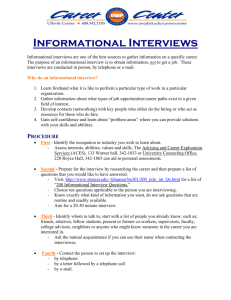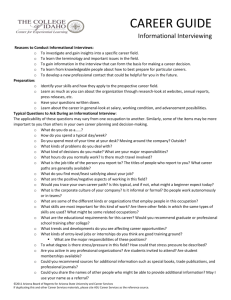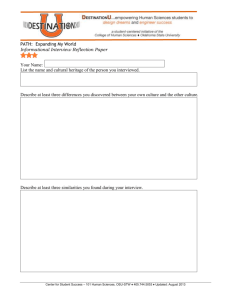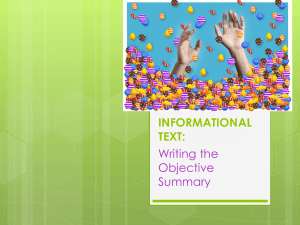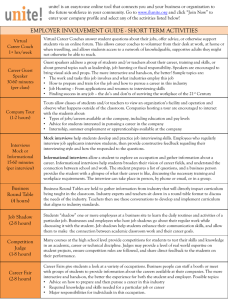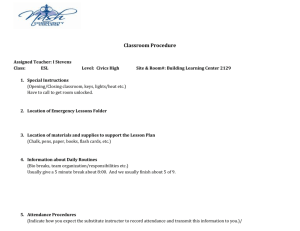INFORMATIONAL INTERVIEWS
advertisement
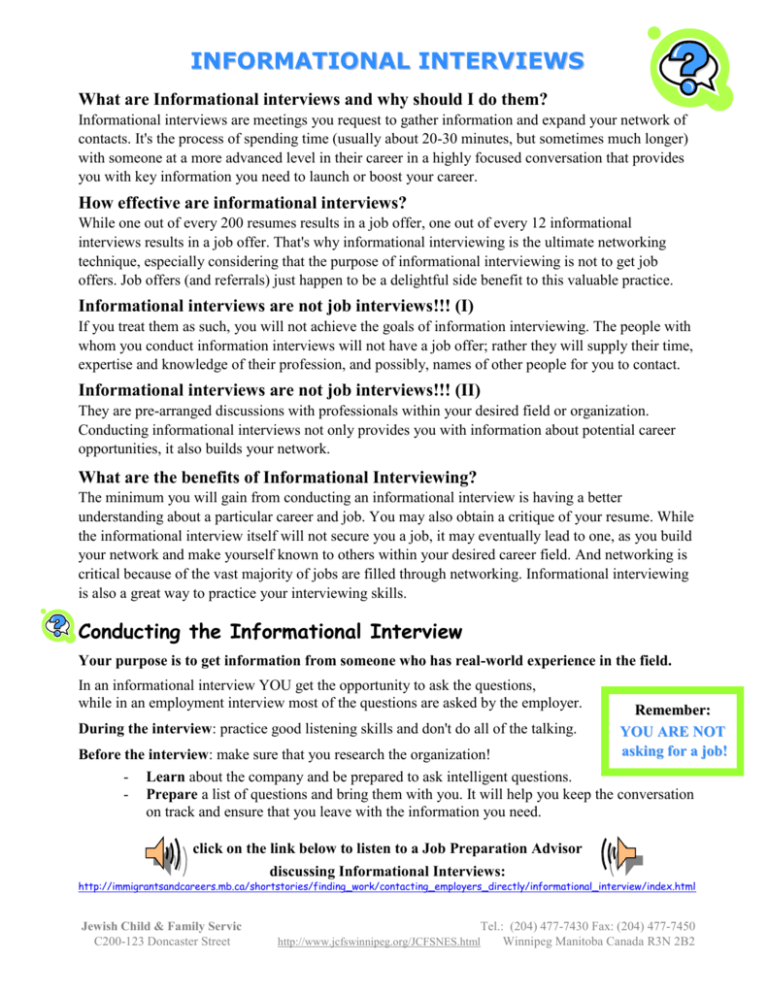
INFORMATIONAL INTERVIEWS What are Informational interviews and why should I do them? Informational interviews are meetings you request to gather information and expand your network of contacts. It's the process of spending time (usually about 20-30 minutes, but sometimes much longer) with someone at a more advanced level in their career in a highly focused conversation that provides you with key information you need to launch or boost your career. How effective are informational interviews? While one out of every 200 resumes results in a job offer, one out of every 12 informational interviews results in a job offer. That's why informational interviewing is the ultimate networking technique, especially considering that the purpose of informational interviewing is not to get job offers. Job offers (and referrals) just happen to be a delightful side benefit to this valuable practice. Informational interviews are not job interviews!!! (I) If you treat them as such, you will not achieve the goals of information interviewing. The people with whom you conduct information interviews will not have a job offer; rather they will supply their time, expertise and knowledge of their profession, and possibly, names of other people for you to contact. Informational interviews are not job interviews!!! (II) They are pre-arranged discussions with professionals within your desired field or organization. Conducting informational interviews not only provides you with information about potential career opportunities, it also builds your network. What are the benefits of Informational Interviewing? The minimum you will gain from conducting an informational interview is having a better understanding about a particular career and job. You may also obtain a critique of your resume. While the informational interview itself will not secure you a job, it may eventually lead to one, as you build your network and make yourself known to others within your desired career field. And networking is critical because of the vast majority of jobs are filled through networking. Informational interviewing is also a great way to practice your interviewing skills. Conducting the Informational Interview Your purpose is to get information from someone who has real-world experience in the field. In an informational interview YOU get the opportunity to ask the questions, while in an employment interview most of the questions are asked by the employer. During the interview: practice good listening skills and don't do all of the talking. Remember: YOU ARE NOT asking for a job! Before the interview: make sure that you research the organization! - Learn about the company and be prepared to ask intelligent questions. - Prepare a list of questions and bring them with you. It will help you keep the conversation on track and ensure that you leave with the information you need. click on the link below to listen to a Job Preparation Advisor discussing Informational Interviews: http://immigrantsandcareers.mb.ca/shortstories/finding_work/contacting_employers_directly/informational_interview/index.html Jewish Child & Family Servic C200-123 Doncaster Street Tel.: (204) 477-7430 Fax: (204) 477-7450 Winnipeg Manitoba Canada R3N 2B2 http://www.jcfswinnipeg.org/JCFSNES.html GOALS of the Informational Interview During the informational interview you will have two main goals: ►Goal 1: Obtain specific information on what it is like to work in the field. Does it use your skills and satisfy your interests? ►Goal 2: Determine the needs and problems you might face in the job. This will help you decide how well you can meet those needs, and it can also help when you become an active job seeker because you will be able to tell a prospective employer how you can meet those needs. TIPS for conducting Information Interviews 1. Assume that most people in responsible positions will be willing to talk with others who are enthusiastic and interested in them, what they are doing, their job and their organization. 2. Don’t confuse it with a job interview: be clear, honest, and unambiguous about your motive or agenda, and stick to the agenda of just getting career information, not fishing for a job opening. 3. Make an explicit appointment for a short period of time (say 20 minutes); be on time, and leave on time. 4. Arrive thoroughly prepared with the questions you want answered. 5. Talk about (or demonstrate) your skills: know what your strengths are; be articulate, she/he cannot help you effectively if you do not explain (or show) what you can do. 6. Leave with at least two referrals to other people in the field that you can talk to in the same way. 7. Take down notes immediately after the interview, recording everything you learned. 8. Send a thank you note right away. 9. 9. Keep well-organized records of your informational interviewing process. Sources: http://www.quintcareers.com/career_doctor_cures/informational_interviews.html http://www.careers.ubc.ca/download/resources_information.pdf http://www.immigrantsandcareers.mb.ca/cdmbnewcomers/short_stories/finding_work/contacting_employers_directly/informational_interview/ http://www.grad.illinois.edu/CareerServices/nonacademic/info_intvws.htm Back to the Job Search Skills Section: http://www.jcfswinnipeg.org/JobInterviewingTipsInformation.html Jewish Child & Family Servic C200-123 Doncaster Street Tel.: (204) 477-7430 Fax: (204) 477-7450 Winnipeg Manitoba Canada R3N 2B2 http://www.jcfswinnipeg.org/JCFSNES.html
